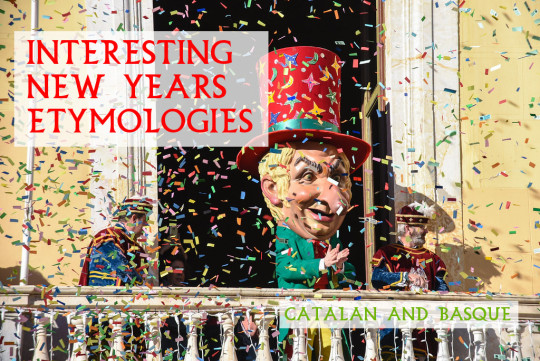#i si vols practicar el català sempre hi estic disposat també :)
Explore tagged Tumblr posts
Photo

(Above: L’home dels nassos, a Catalan New Years Tradition, in the city of Tarragona, where he is represented with a tradition capgros costume; from Raquel Fabregat Moliner on Flickr.)
Kaixo @givemethelanguages, I’m your @langblrsecretsanta for this year! I saw that you’re a linguistics major and study Basque and Catalan (all of which are things I am too), so I kind of went off for your present, I hope you don’t mind. I thought it might be interesting to combine some seasonal vocabulary in Catalan and Basque with historical linguistics, so here’s some fun etymological tidbits for you! Also we should definitely talk in Basque and Catalan I need more friends who study them
revetlla
the night before a festival, like English Eve or Spanish verbena
Etymology: from vetllar ‘to hold vigil, watch over’ (cognate with English vigil), which comes from Latin vīgīlare ‘to stay awake, hold vigil’; there is also a vigilar in Catalan, which comes from the same root but is a much later loan, the first being from the 13th century and the second from the 18th century.
Home dels nassos
the “Man of the Noses”, a Catalan tradition in which there is said to be a man with as many noses as days of the year, but who only becomes visible on December 31 (when he has one nose like everyone else)
Etymology: nas ‘nose’ from Latin nāsus ‘nose’ (cf. French nez and Italian naso); the Spanish and Portuguese nariz ‘nose’ comes from Latin nāris ‘nostril’, which also gives Catalan nariu ‘nostril’. All of these, in addition to the English nose, come from Proto-Indo-European néh₂s ‘nose’.
raïm
grapes (or a bunch), which are eaten with each bell toll at midnight on New Years (same as in most of Spain)
Etymology: either from Old Occitan razim ‘grape’ or Vulgar Latin racīmus, ultimately coming from Latin racēmus ‘bunch of grapes’; compare French raisin ‘grape’ and Spanish racimo ‘bunch (of fruit)’, which come from the same root. A single grape can also be gotim, which is a Catalan innovation possibly deriving from gota ‘drop’. Another interesting grape-related word is bagot ‘unripe grape left on the vine’, which may come from Proto-Celtic *bekos ‘bee’.
campanada
a bell toll, most prominently the bell tolls at midnight on New Years (although it can refer to any bell tolling as well)
Etymology: from campana ‘bell’, from Latin campāna, the demonym for the Campania region of Italy where the best bronze to make bells came from; this in turn comes from Latin campus ‘open or flat space, plain’, meaning that Catalan camp ‘field’ and campanada are cognate (and are cognate with English camp as well).
Olentzero
the Basque Santa Claus, who comes on December 31 in the town of Ermua (although on December 24 in most places)
Etymology: of unclear origins, attested forms include Onenzaro, Onentzaro, Olentzaro, Ononzaro, and Orentzago; the most sound theory posits that it was originally Onentzaro and is derived from on ‘good’ and -zaro ‘period of time, season’, referring to the winter solstice holiday (and possibly relating to the Spanish nochebuena). The holiday is called xubilaro or subilaro in some parts of Navarre, from subil ‘Yule log’ and -zaro; in other parts it is known as sekularo, which is likely to come from Latin saeculāris ‘worldly, temporal, profane’.
Urte berri on! / Bon any nou! / Feliz año nuevo! / Happy New Year!
#hope you enjoy it!#euskaraz oso ondo hitz egiten duzu#ez nekien zer egin zuretzat euskaraz#baina hitz egin nahi baduzu praktika egin nahi dut!#i si vols practicar el català sempre hi estic disposat també :)#langblrsecretsanta2019#catalan#basque#linguistics#vocab lists#(i guess)#catalan:general#catalan:vocab#catalan:culture#catalan:linguistics#basque:general#basque:vocab#basque:linguistics#general:culture#general:linguistics
64 notes
·
View notes